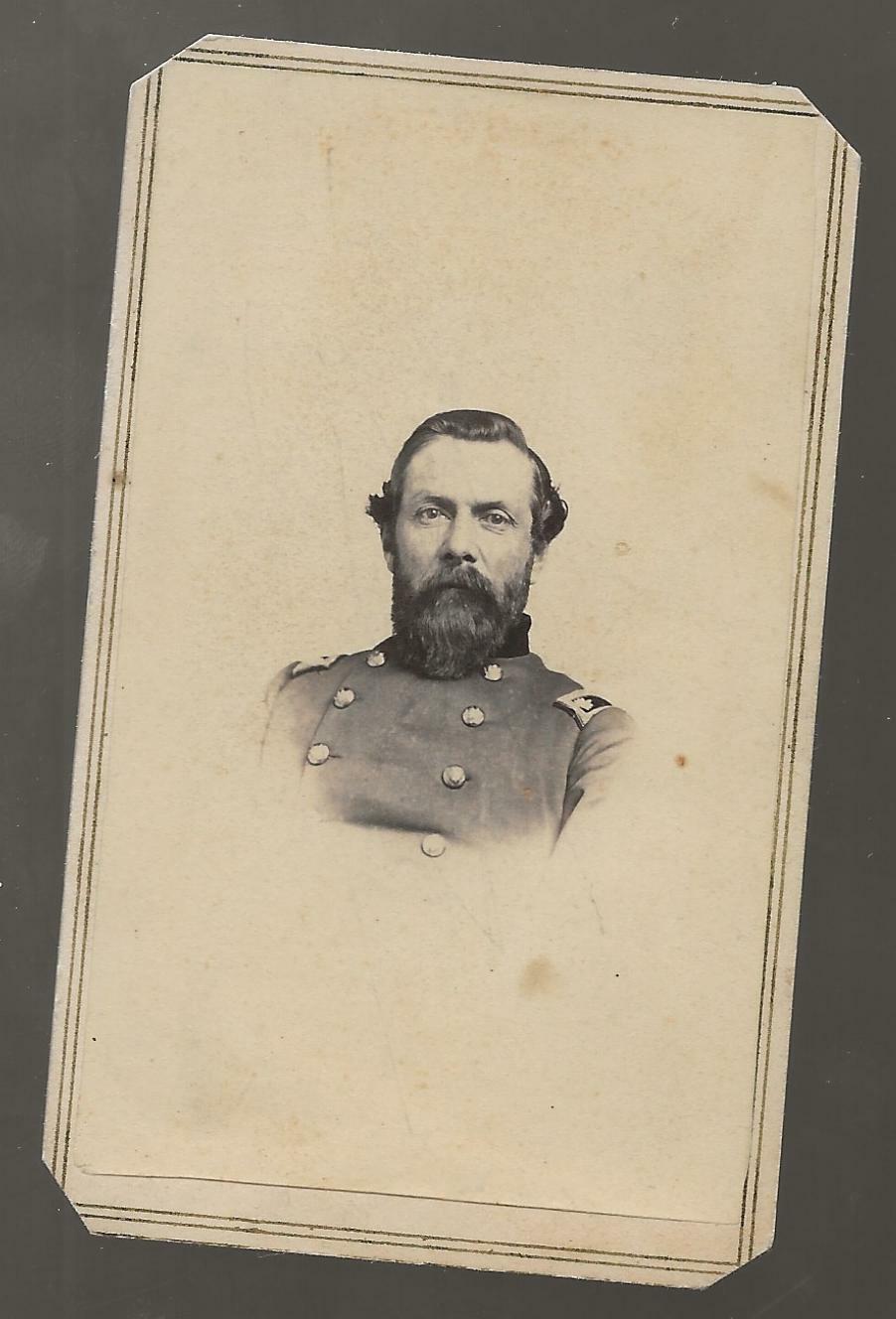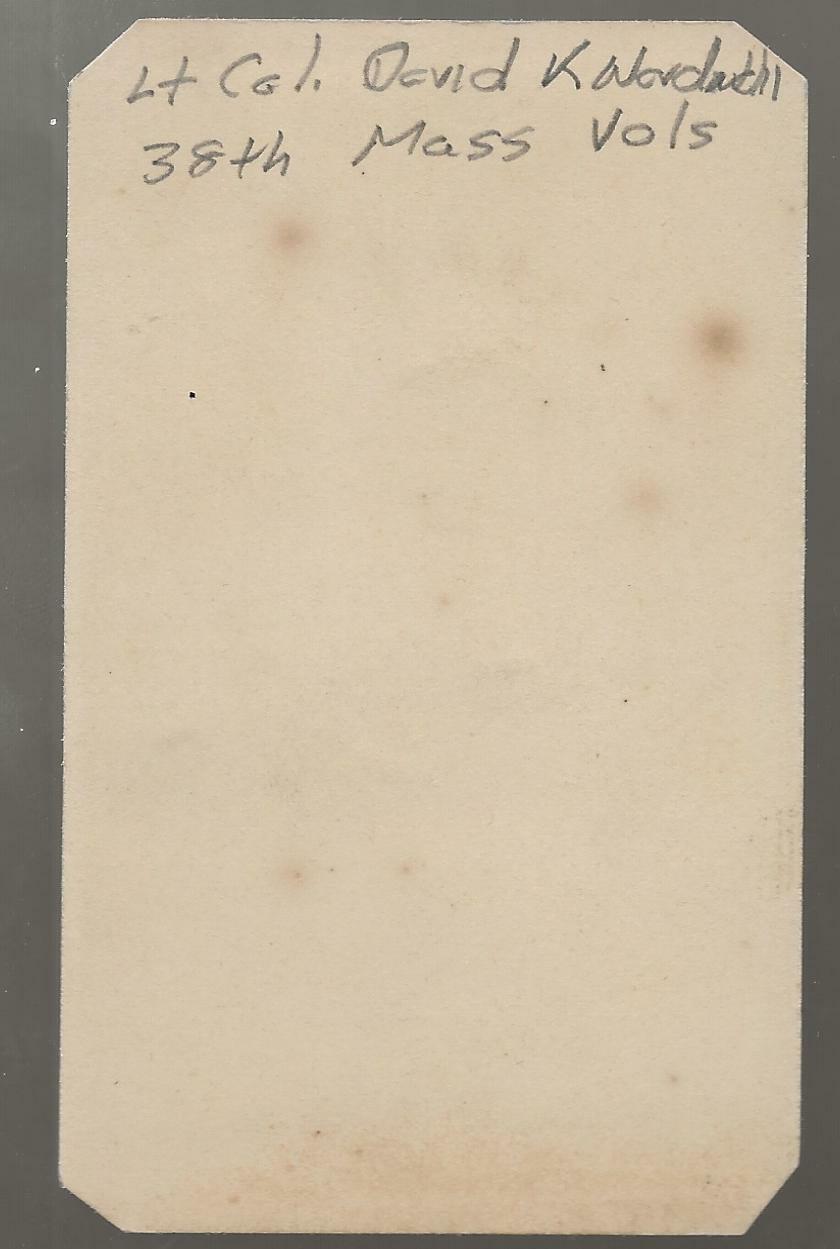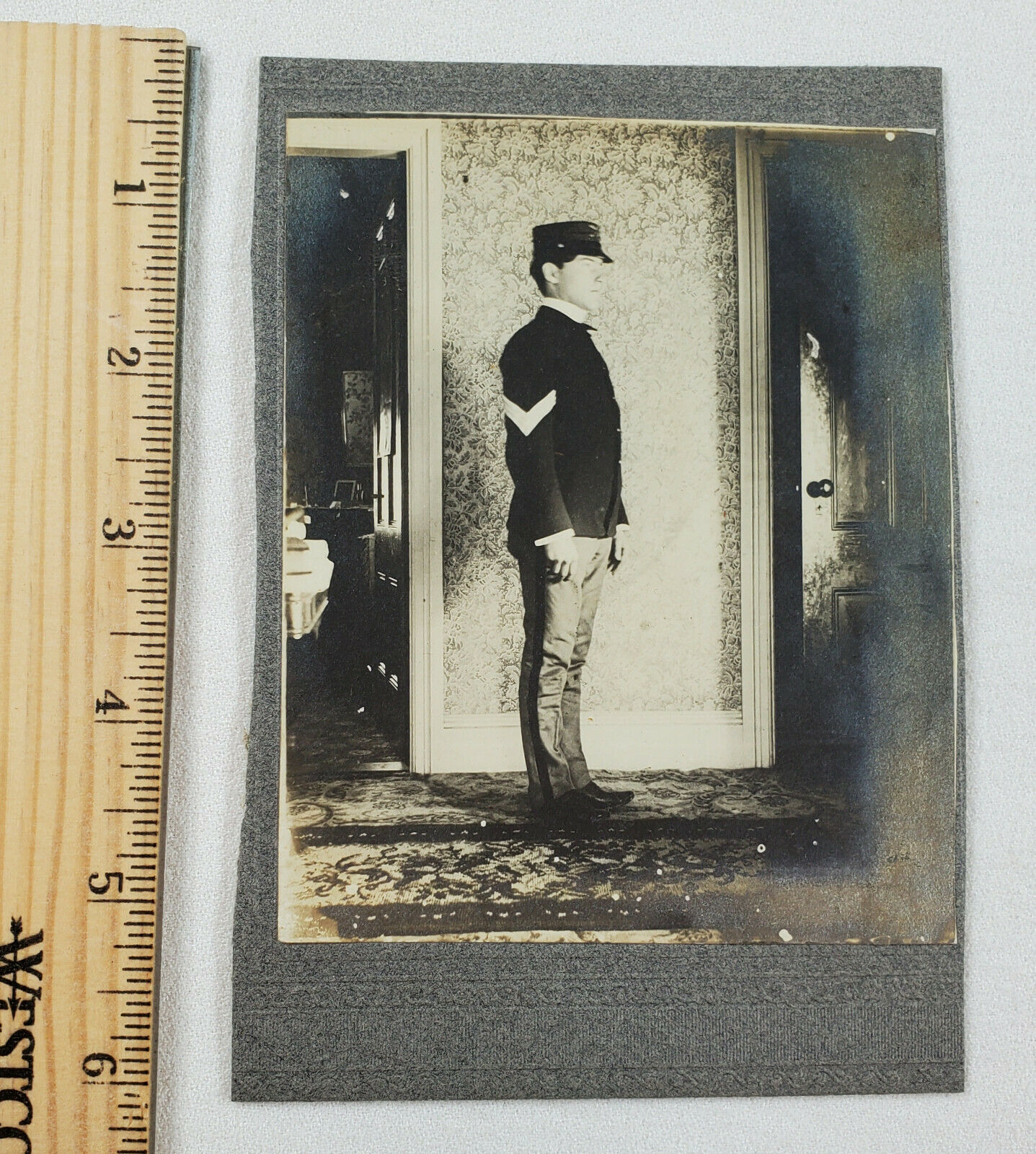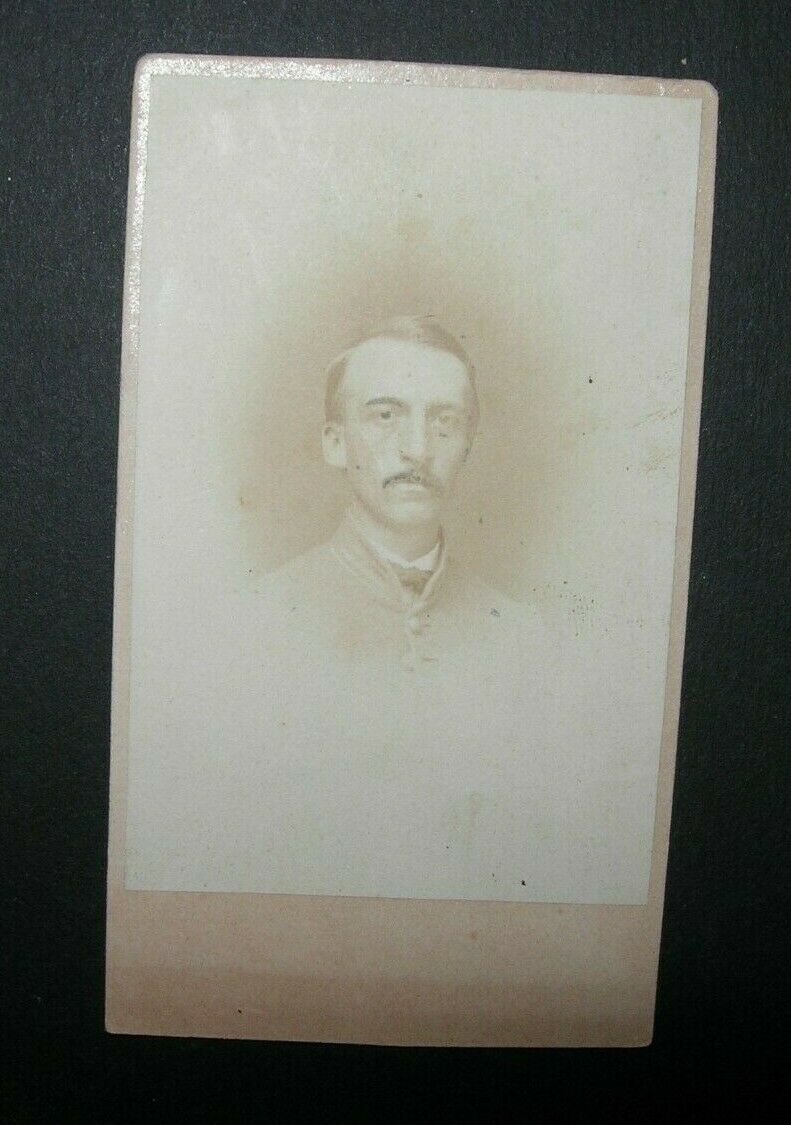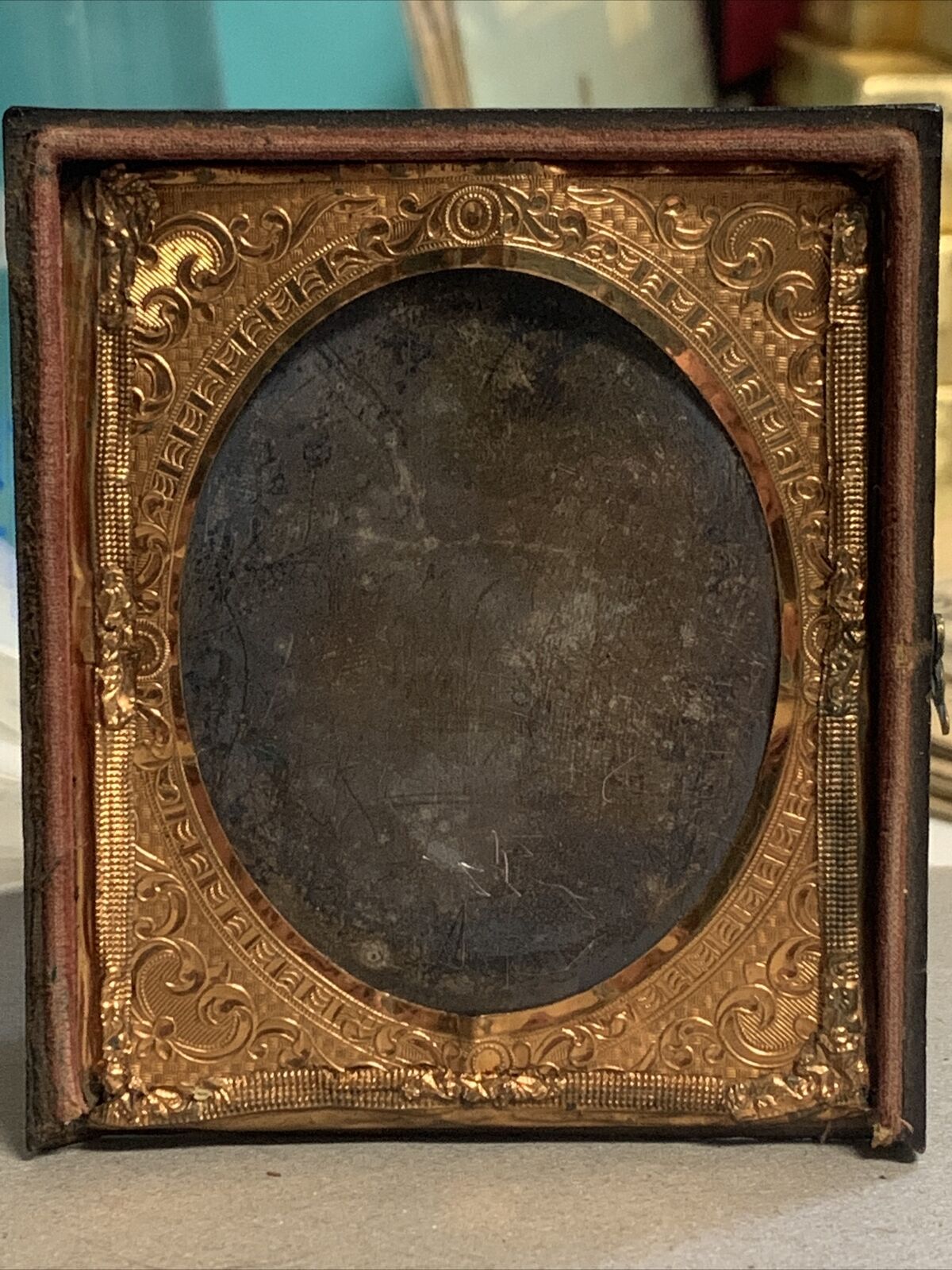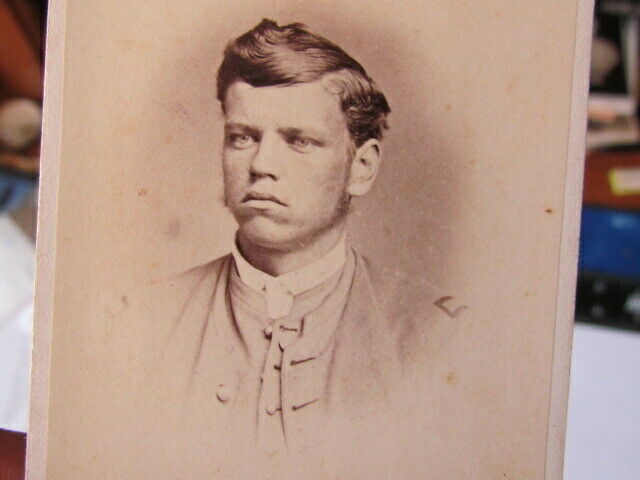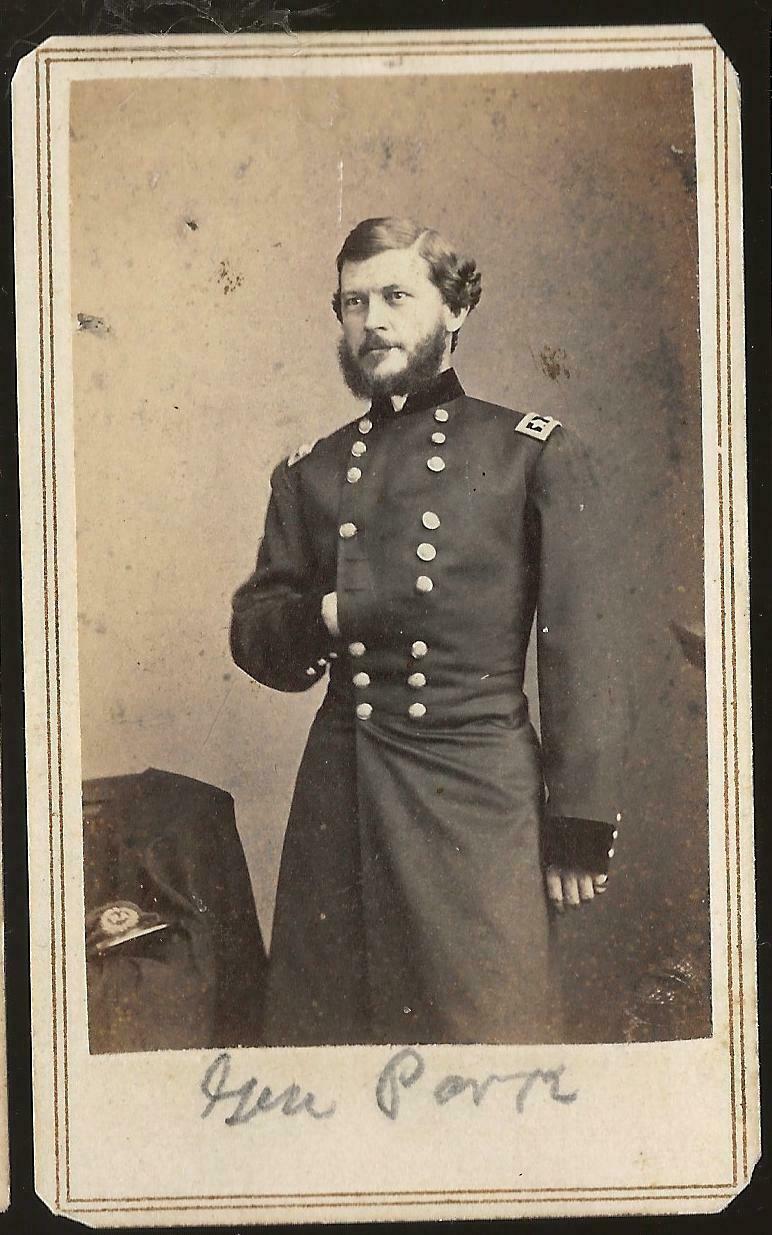-40%
Civil War CDV Lt Colonel David K Wardwell 38th Mass Vols, Resident Tombstone AZ
$ 132
- Description
- Size Guide
Description
Condition as seen. One of the most fascinating Histories of anyone I have listed on ebay in a long time. Served in three regiments during the War, 5th, 22nd and 38th Mass Vols, before being discharged for disability injured while in the field, later spent most of his life out West in the famous town of Tombstone Arizona where he was a Justice of the Peace and Legislature. Read the following; "
Birth[1]
18 NOV 1823
Oxford, Oxford, Maine, United States
Marriage
ABT 1844
Spurrs Corner, Cumberland, Maine, United States
to Sarah S. Briggs
Marriage
1 JUN 1854
Medford, Middlesex, MA
to Susan P. Briggs
Other
Marriage Ending Status Divorce
with Susan P. Briggs
Other
1864
Marriage fact
with Susan P. Briggs
Marriage
1864
to Anna M. Weeden
Other
Marriage Ending Status Divorce
with Anna M. Weeden
Other
1887
Marriage fact
with Anna M. Weeden
Marriage
29 MAY 1893
Cochise County, AZ
to Isabella Victoria Cole
Death[2]
15 AUG 1908
Tombstone, Cochise, AZ
Occupation?
Painter in 1850 & 1860, Stockraiser in 1890, Postmaster in 1900
Burial?
Evergreen Cemetery, Tombstone, AZ
In Boston, working as painter at 1850 census. Listed as 30 years old at second marriage. Living in Stoneham in 1852 (occupation painter), 1855 and 1857 (occupation Custom House Official) when children were born. Working as a painter in Boston in 1852 when he filed a libel action against the Sunday Morning News. Living in Boston, working as a painter at 1860 census. Abandons his wife (who divorces in 1864 him charging desertion), who is listed as Susan Cook, a widow, in Boston at 1900 census living with son Howell.
A 30 year old David K. Wardwell is iving in Los Mimbres, Grant, New Mexico at 1870 census. Real estate valued at 00 and personal estate value of 0. Birth place is listed as Virginia. An 18 year old Catherine Wardwell, born in New Mexico, is living with him.
1st Sgt. Company E Massachusetts Volunteer Infantry in Mexican War enrolled 14 October 1846 and mustered in 05 January 1847 at Boston. Mustered out 25 July 1848 at Boston.
Enlisted as a Captain in Civil War on 19 April 1861 at the age of 36 Commission in Company F, 5th Infantry Regiment Massachusetts on 01 May 1861 Mustered out on 31 July 1861 in Boston, MA Promoted to Full Captain on 02 September 1861 (As of Co. B 22nd MA Inf) Commission in Company B, 22nd Infantry Regiment Massachusetts on 02 September 1861 Promoted to Full Lieutenant Colonel on 19 August 1862 (As of 38th MA Inf) Commission in Company S, 38th Infantry Regiment Massachusetts on 19 August 1862 Mustered out on 23 August 1862 Received a disability discharge on 24 January 1863 -Massachusetts Soldiers, Sailors and Marines in the Civil War. (MASSCW) Published in 1931-37 by Adjutant General
"Colonel David K. Wardwell was born in Washington, D. C.( sic), in 1823. In 1846 he enlisted in Company F, First Massachusetts Volunteers, and served as First Sergeant through the Mexican war, under both Generals Taylor and Scott, and at the battles before the City of Mexico, was a member of the staff of Brigadier-General Franklin Pierce. At the close of this war he located in Boston and upon the first call of President Lincoln for troops, April 15, 1861, raised a volunteer company, which was assigned as Company F, Fifth Volunteer Militia. He commanded this company during the three months' campaign, and rendered conspicuous service at the first battle of Bull Run, July 21, 1861. In August, 1861, he was appointed Captain of Company B, Twenty-Second Massachusetts Volunteers, and served through the Peninsular campaign with marked efficiency. In August he was commissioned Lieutenant Colonel of the Thirty-Eighth Massachusetts Volunteers and accompanied that command to Louisiana. Ill health prevented him from taking part in the field operations of this Regiment, and he was transferred with the rank of Lieutenant Colonel to the Veteran Rescue Corps and assigned to duty in the state of New Hampshire, to enforce the Draft, which duty was faithfnlly performed. After this he served in various capacities, and at the close of the war was on the Rio Grande. Colonel Wardwell was a most energetic and capable officer, and received many very complimentary notices from his superior officers. After the war he located in Arizona and held various local offices. Always foremost in line of improvements. Died in 1903, and was considered a great leader among progressive men." -History and Complete Roster of the Massachusetts Regiments MINUTE MEN OF '61 who responded to the First Call of President Abraham Lincoln, April 15, 1861, to defend the Flag and Constitution of the United States
"The new Volunteer Company formed by D. K. Wardwell, met at Independents Hall, No. 18 Howard street, yesterday afternoon, for the purposes of electing officers. Col. Cowdin, of the First Regiment, presided and was assisted by Adjutant Beach and Quartermaster Stetson. The following officers were unanimously elected: Captain, D. K. Wardwell; 1st Lieut. J. Henry Sleeper; 2d Lieut. George G. Stodard; 3d Lieut. H. P. Williams; 4th Lieut. Horatio N. Holbrook. " -APRIL 19, 1861 http://www.letterscivilwar.com/4-19-61c.html
Pension application filed 16 August 1901. says he was 5'6" with light complexion, gray blue eyes and light brown hair. Claims he was an invalid "while assisting his soldiers in falling trees to make a breast work for the protection of his men, a limb became tangled in some way and sprang loose and struck (him) right across the nose and right eye and cheek. (He) has suffered from the injury to his eye ever since. They older he became the worse it grew until now he can scarcely see to read and right. During the Peninsular Campaign in 1862, (he) contracted chronic diahrrea, intenstinal piles, malarial fever and rheumatism from which he has suffered ever since."
A Justice of the Peace (appointed 06 Jul 1887 in Cochise) who performed marriages in Arizona. Registered to vote in Tombstone on 23 June 1890. Living in Township 21 Range 19, Cochise County, Arizona at 1900 census.
"In the Common Pleas Court at Boston on Friday, the case of David K. Wardwell vs. J.A. Adams, for a libel published in the Sunday News, was tried, and the jury returned a verdict for the plaintiff, assessing damages in the sum of ,269." -New York Times 19 October 1852 Original court document examined at Massachusetts State Archives. Sued for a "false and malicious libel". Had sought 5,000 dollars in damages. Defendants did not appear for trial. The jury assessed and awarded damages.
Oxford Maine Democrat August, 1908, reporting the death, of General David K. Wardwell: "immediate cause of his death was over exertion and excitement caused by the taking of his young wife from a leper's hospital in Los Angeles and flight to Arizona. He leaves a Widow, two sons and one daughter."
KIDNAPS LEPER WIFE TO BE WITH HER UNTIL THE END Gen. Wardwell Flees to Mexico with Woman-Took her from Hospital Los Angeles, July 31-Knowing that his wife was suffering from leprosy, Brigadier General David K.Wardwell, retiree, a hero of two wars, secretly and in the night stole the woman from the contagious ward in the county hospital, and has secluded her in Mexico, where he will make his home with her. An attempt is being made to locate them by the authorities only in order to account to the government. Both, according to the officials of the county hospital, threatened to commit suicide if they were not allowed to spend the remainder of their lives in each other's company, even if it were in isolation.
Three nights ago Mrs. Wardwell, at one time a beautiful woman, was removed from the contagious ward in the county hospital. The next morning an opened window and a note thrown carelessly upon the window sill told the story of the woman's flight. "We will not be molested in Mexlco--it was there where we were married, and we will be allowed to die there ---together." A cursory investigation showed that the couple got aboard a late night train for Mexico. When supervisors and county health officials were told of the circumstances they made no comment, found no fault. "It is the best thing that could have happened." said one official, "and I am glad the general secured his wife. He married her with the knowledge that she would have leprosy; he wishes to die with her."
Aged Man All Devotion
Down at Sawtelle, in the neighborhood of the soldiers' home, the love story of the couple is well known. The tender devotion of the aged warrior to his wife when she daily showed signs of the dread disease slowly creeping over her, endeared the man to those in the neighborhood where the couple resided. Although Mrs. Wardwell often asked that she be allowed to give herself up to the authorities and asked to be taken to Mexico by her husband, the sturdy little general refused to allow it. Four weeks ago, however, Mrs. Wardwell resolved to give herself into the custody of health officials. Leaving the vine-covered cottage in Sawtelle, the woman came to Los Angeles. The great mental strain she underwent caused her to faint when within a block of the police station. With tears in his eyes the aged general pleaded with the health officers to be allowed the privilege of taking the woman to Mexico, but they were obdurate. Wardwell stated that he was suffering from leprosy, but an examination showed he was not. Eighteen years ago General Wardwell, then lieutenant colonel, resided in Cananea, Mexico. He had previously served in the civil war, had proved a hero in the battle of Gaines' Mills, being rewarded publicly by Governor William Claflin for his meritorious service and he was commended by the president of the United States to the Mexican authorities. It was in Cananea, after he had served in the Mexican war against Maximiilian, that the general met Mrs. Wardwell, then Miss Isabel Cole. The woman was dark and beautiful, her relatives were among the best people of the country, her education faultless. For two years she nursed a brother, afflicted with leprosy, in a futile attempt to save his life. The general married her with the knowledge that she might some day have the dreaded disease and a short time later they came to California. Here they spent the last eight years and it was here the first symptoms of the disease were noticed. -Fort Wayne Sentinel, 31 July 1908
"WON'T DESERT LEPER WIFE. Arizona Authorities Holding Gen. and Mrs. Wardwell In Quarantine
TOMBSTONE, Arizona, Aug. 6.-With Mrs. Wardwell suffering from a well-developed case of leprosy, Gen. D. K. Wardwell and his wife are under strict quarantine here. Both the Arizona Health Department and the Board of Supervisors are considering plans to return the couple to California, compelling the Southern Pacific railroad to transport them to Sawtelle, from where they came. The couple were formerly Tombstone residents, Gen. Wardwell being a veteran of the Mexican and Civil Wars. For the past year he has been an inmate of the soldiers' Home at Sawtelle, where his wife also resided. Wardwell, himself a sufferer from a cancerous growth on his eye, but with no leprous symptoms according to the doctors who examined him, avows his intention of accompanying his wife should she be deported to the leper colony. Mrs. Wardwell, who gave herself up to the Health authorlties at Los Angles, left the hospital in company with her husband. At the time it was thought that their destination was Mexico." -New York Times 06 August 1908
"DIES BEFORE LEPER WIFE Gen. Wardwell Broke Down Under Strain of Caring for Her.
Special to The New York Times BISBEE. Ariz., Aug. 15.-Gen. David K. Wardwell, a veteran of the civil and Mexican wars, who stole his wife from a Los Angeles Hospital when the authorities declared her a leper, died this afternoon in a quarantine cabin at Tombstone. His exertions last month in abducting his wife, the effort to flee to Mexico with her, and the nervous strain combined to end the life of the hero, who sought to be a leper that he might remain by his loving wife. He was unconscious most of the time during the last twenty-four hours, but when conscious he begged for the future care of his wife. While unconscious the veteran lived over the many exciting scenes of his life and talked of the early war days. He mumbled his praise for Gen. McClellan. who promoted him for gallant conduct in the field. He muttered his dread of separation from his wife with threats of vengeance against those who might seek to send her from him. In the adjoining room his leper wife, tied to a bed, screamed and struggled for freedom. She has not been told that her husband is dead, and will not be, since she is insane and not in a condition to realize what is happening. Gen. Wardwell will be buried in Evergreen Cemetery, Tombstone, tomorrow by Burnside Post of the Grand Army of the Republic." -New York Times 16 August 1908
THE GENERAL and THE LEPER 2001 Marjorie Wardwell Otten, 201 4th Street #222, Del Mar, CA 92014
Most of the locals of Tombstone called him "The General". A silver-haired man with an erect military posture, he made an imposing appearance. His name was David Kilbourne Wardwell, and he had first seen "The Great Southwest" when, at the age of 24, he had enlisted as a private in the First Massachusetts Volunteers, Company E, to fight in the Mexican War. {1} During this service he won the rank of 2nd Lieutenant. {2} Wardwell was born in Oxford, Maine, on November 18, 1822, the eldest of the seven sons of Abigail (Lovering) and William Wardwell. {3} Around 1844, he married a local girl, Sarah Briggs, and they left Maine to set up housekeeping in Boston, where their daughter Sarah was born.{4} At the onset of the Mexican War, Wardwell enlisted in the Army. He returned to Boston after his honorable discharge and here continued his trade as a housepainter.{5} His wife Sarah died May 17, 1854, age 34, and in the following winter David married her sister, Susan Briggs. Their first child, Susan Isabel, was born in August of 1855, but died in July of the following year. A son, Howell Cobb Wardwell, was born in 1857 {6} and another son followed in the early 1860's. At the outbreak of the Civil War, Wardwell enlisted in the 22nd Regiment of Massachusetts Volunteers, Company B, and then transferred to the 5th Regiment, Company F, of which he was Captain. In August of 1862, he was promoted to Lieutenant Colonel of the 38th Massachusetts Volunteers, from which he resigned on December 3, 1862, listed as a "casualty". He was assigned to the 13th Massachusetts Regiment (Veteran Reserve Corps) in 1863 and served until July 11, when he resigned. {7} Susan (Briggs) Wardwell, charging "desertion", divorced her husband in 1864. With the end of his marriage and of the War, Wardwell headed westward. By 1868 he had acquired a ranch onor near the Mimbres River in Grant County of southwestern New Mexico.{8} In the New Mexico Federal Census of 1870, he is listed as David K. Wardwell, residing in the town of Las Membres, Grant County, a farmer with Real Estate valued at ,000 and a Personal estate of 0.{9} In 1871, the Silver City Rangers of Grant County captured Chief Mangus, the nine-year-old only son of the great chief Mangus Colorado, "who for many years was the scourge of New Mexico and Arizona". The youth was taken to Silver City and placed one after another with various citizens, but no one could cope with him, for most southwest Anglo ranchers were contemptuous of both Indians and Mexicans. "Finally, however, Mangus came into the possession of General Wardwell, who was then a resident of Grant County. The General took the young Chiricachua to his ranch, gave him a horse and turned him loose on the range with his cattle. Mangus manifested a good deal of interest in the business and soon became an expert vaquero. He remained with the General for about four years. Then, upon the demands of his tribe, he returned to them to assume his position as their Chief."{10} The General left New Mexico in the late 1870's, and purchased a cattle ranch in the Huachucas of southernmost Arizona. The area became a part of Cochise County when it was created in 1880. He was elected to the Arizona Territory Legislature when it convened in the then capitol at Prescott and served two terms as the representative from Cochise County. In late May of 1882, he was quoted as saying that "he was as strong a Democrat as ever but he can vote for a Republican if he is the best man."{11} Mayor Carr of Tombstone in a letter to Wardwell in February of 1883, wrote that "in a full meeting of the Council of the City of Tombstone, the action and course pursued by Mr. Wardwell in the Legislature was heartily approved by them".{12} In June of 1884, he sold his ranch and cattle, perhaps to concentrate on his legislative duties. However, on the 23rd of September, 1886, the Arizona Journal-Miner reported that "the War-horse of the Huachucas--General Wardwell--will not be heard in the halls of the Arizona legislature next fall. Twice the General has represented Cochise County in the legislature--honestly and ably too--but the Democratic convention held in Tombstone last weekend declined to renominate him. The war-horse can now bid farewell to all his former greatness as well as to the smiles of the female legislative clerks." In all probability, the General's great tolerance of Indians and Mexicans was not acceptable to the other "gringos" of the territory. In October of 1886, it was reported that "the war-horse" had been appointed to an Indian agency in Idaho. {13} However, if he accepted this position it was of short duration; for on February 4, 1887, in Arizona, Wardwell, now 65, applied for and received his Mexican War Pension. (14} Around 1901, The General married the widow Isabella (Cole) Escobide, aged about 20. She had been born in Guaymas, Mexico, daughter of a Canadian, John Cole, and his wife, Angeline Campbell. Angeline had been born in Mexico, her mother perhaps a Mexican national while her father was English. {15} Isabella's first husband, Eduardo Escobide, had left her a widow at the age of about 19. In the western border states, racism then, as now, was rampant. The "anglos" called Isabella (who, at the most, was only one-fourth Mexican), her mother and her late husband, "hexes", objects of discrimination as were the "red devils" (Indians). Some time prior to 1908, The General and Isabella moved to Los Angeles County in Southern California, where David entered the newest National Home for Disabled Volunteer Soldiers, which was locally called "Sawtelle". It had been designed by the renowned architect Sanford White and veterans did not have to be sick or wounded to live in this free facility. Along Nevada Avenue---now Wilshire Boulevard---there were cottages for wives to live in rent-free. {16} On July 16, 1908, while Isabella was visiting with David at Sawtelle, someone noticed her hands and she was immediately hauled off to the Los Angles County Hospital and placed in the isolation ward, diagnosed as having leprosy. It was said that she had contracted the disease while nursing her brother some ten years earlier. The source of this accusation is unknown. Perhaps it came from other veterans' wives who were jealous of the attractive "Senora" Wardwell or from those who were disinclined toward Mexicans. Twelve days later, on July 28th, David quietly slipped out of Sawtelle, made his way downtown, and somehow managed to smuggle Isabella out of the County Hospital. From there they made their way by train to Tombstone. Later, according to Dr. H. A. Bishop of Tombstone, "The leper woman was quarantined in a corner of the hospital grounds in Tombstone. We paid little attention to her when she first came; only a few persons knew her condition. General Wardwell, however, was well known in Arizona and all the old-timers in Tombstone were acquainted with him, either personally or by reputation. When it became known that the General had brought his wife to Tombstone and it became noised about that the circumstances of his visit were peculiar, curiosity was naturally aroused. Still, the fears of the people might have been quieted but for the General himself.The devotion of that old man to his wife was something wonderful. He loved her despite her terrible disease and wanted to be with her all the time. That was considered impossible. To defeat the authorities, he announced that he, too, had leprosy. The subterfuge was readily discoverd; then he said that he would become a leper himself.He tried by every means to contract the disease. "{17} Less than two weeks after their arrival in Tombstone, on August 8, 1908, General David Kilbourne Wardwell died just three months shy of his 86th birthday. The obituary in his hometown newspaper, The Oxford Democrat, reported that "the immediate cause of his death was over exertion and excitement caused by the taking of his young wife from a leper's hospital in Los Angeles and flight to Arizona. He leaves a widow, two sons and one daughter." The widow Isabella remained in her tent on the mountainside, "shunned and dreaded by all, but untouched and unmolested", while officials determined what to do with her. Then on August 19th the media reported that "Mrs Wardwell had eluded her guards, escaped from her shackles, and returned to Los Angeles via the Sunset Limited train." Railroad officials had notified the Los Angeles County Hospital, and Isabella was returned to the contagious ward there. "The hospital authorities think she should be returned to her old home in Guaymas, Mexico. In reality, Isabella had been kidnapped by none other than Dr. Bishop and a Tombstone health officer. Bishop, "who seemed well pleased with himself for auto kidnapping", stated: "I was anxious to have Mrs. Wardwell removed from the hospital grounds. The people avoided the hospital as if it were a plague spot and it was impossible to make them understand that there was no danger. I therefore determined upon a bold move.It was to take her forcibly from the tent where she was quarantined and place her aboard a train for Los Angeles. At 10 o'clock on Tuesday [August 18] we had an automobile waiting in a dark spot not far from her tent. I was the only doctor who would handle her. I had given her a scrubbing with a broom when she was admitted to the hospital and she was afraid of me. We didn't want to attract any attention or create suspicion, so every move we made was a cautious one. She left the tent without resisting, but fought against being placed in an automobile. We were soon on our way, however, and no one in Tombstone had detected our enterprise. "{18} Isabella was placed aboard the train at Benson and the authorities in Los Angeles were notified of her arrival. The assistance of a leper in flight from one State to another or, as in this case, from the Territory of Arizona to the State of California, was a situation without precedent. The two jurisdictions, as far as lepers were concerned were entirely different, with each having its own laws pertaining to the disease and prescibing regulations. The fact that Isabella had not only been kidnapped but also transported from one jurisdiction to another and that no one was accused nor prosecuted for either crime, was never explained. Late on August 20th, Dr. Barber, a County Hospital doctor, said of Isabella Wardwell, "I do not believe she is a leper. When I say that, I know I contradict the opinions of a good many doctors, but leprosy is a disease with which few practitioners are familiar. {19} The next day, Isabella was reported as saying that when she becomes stronger she would force the issue as to whether she was a leper. "The condition of my hands arises from a nervous disorder. I have never seen a leper and certainly' am not one myself. I have just written my son in Tombstone. asking him to rescue me from this place. I wrote him that such a misuse of power and such inhumanity was never known before. " {20} For over three months, Isabella languished in the isolation ward of the Los Angeles County Hospital. On December 2, 1908, at 7 a.m., the twice-widowed Isabella (Cole) Escobide Wardwell died after 106 days of incarceration. On the death certificate in the space for "color or race" was written "Mex", which was then scratched out and "white" inserted. Her age was shown as "35?" Stamped upon the certificate was "Private Funeral". She was interred at Mountain View Cemetery, Pasadena, California. The San Francisco Call's obituary, reported from Los Angeles on December 2nd, had headers reading "Leprosy Ends Life of Gent Wardwell 's Widow" -- "Mexican Suffering from Same Disease Also Died in Los Angeles County Hospital": "Mrs. D. K. Wardwell, the leper wife of General Wardwell, whose case created such a stir in this community and in Arizona, died this morning in the county hospital of leprosy. "Another leper, Trinidad Ortego, a Mexican about 35 years old, who came here from Mexico recently, also died today of the disease. Ortego walked all the way from an interior point in Mexico in great distress from the disease of which he did know the deadly nature until examined by the county physicians.He was sent to the hospital on November 20. "Still another case of leprosy at the county hospital is that of Antonio Mora, a Mexican who also came here recently from his native country. The authorities have been considerably perplexed to know what to do with the victims of leprosy who come here from Mexico." The California State Board of Health reported five deaths from leprosy in 1908, three having Hispanic backgrounds. Yet the U. S. Public Health Service reported only one case ofdeath from leprosy in the United States in 1908, that in the state of Virginia.{22} The statistics are very questionable, both as to the diagnosis and the number of occurrences. At the time, the medical knowledge of leprosy was very limited, and remained so for many years. Nevertheless, it was not the disease but rampant discrimation that was all too evident in The General's story.
[1) Index to Mexican War Pension Files", Virgil A. White, 1989, p 555 [2) Oxford (MA) Democrat, Obituary, August 25, 1908 [3] History of Otisfield, Maine, William S. Spurr, 1948, pgs 626-627 [4] ibid p 340 [5) United States Federal Census of 1850 & 1860 [6) History of Otisfield p 341(marriage date in error) [7) Official Army Register of the Volunteer Force of the U.S. Army, 1865 (reprinted 1987) 1:120; 1:181; 8:51 [8] Next Stop: Tombstone, Diary of George Hand's Contention City (AZ), 1882, Transcribed and Edited by Neil B. Carmony, p 23 [9) United States Federal Census, 1970, #260 [10] "Chief Mangus", Arizona Daily Star, May 5, 1886 [11] Next Stop... [12] The Courier, Prescott AZ, February 24, 1883 [13] Arizona Journal-Miner, October 16, 1886 [14) Index to Mexican War Pension... [15) Death Certificate, State of California, December 2, 1908 [16) "L. A. Scene", Cecilia Rasmussen, Los Angeles Times, August 29, 19 [17) San Francisco Examiner, August 19, 1908 [18) ibid, August 21, 1908 [19] ibid, August 22, 1908 [20] ibid [21) Death Certificate [22) California State Library, November 13, 1998
ARIZONA JOURNAL-MINER J.C. Martin, Editor Thursday, December 30, 1886 A SOLDIERS RECORD
As a friend and admirer of General D. K. Wardwell, the democratic "wah b0ss" of Cochise county, we demand---well perhaps that is putting it a little strong, so we will request that a grand jury be immediately impaneled for the purpose of indicting Frank M. Finn, for writing and having published in the Boston Sunday Globe, a good democratic paper, the following malicious and defamatory libel on one of Arizona's citizens. Mr. Finn claims to have served under the "general" in the war and consequently his article is all the more pointed on that account. Here is what he says: "Lieutenant Colonel David K. Wardwell of Stoneham, Mass., took charge of the regiment and looked after battalion drills and dress parades. "Colonel Wardwell's father was a rank Methodist, but it was evident to everyone who came in contact with "Dave" that he inherited some of his father's religious tendencies. Especially was this noticeable when on drill, for, did any movement go wrong or any soldier make a false movement, "Dave's" emphatic use of adjectives betrayed his lack of spiritual culture. Colonel Wardwell came to the regiment from the army of the Potomac, and had a pretty good opinion of himself and the military knowledge he had gained in the army. The members of the regiment being wholly unused to the art of war, in their simplicity looked upon Colonel Wardwell as a prodigy of valor. He took advantage of this greenness of the men and filled them full of stories of his exploits and desperate encounters with the rebels while connected with the army of the Potomac. But it did not take long for the boys to take "Dave's" measure and get on to his military career, and when once it was known, their idol of greatness was shivered and "Dave" was relegated to the ranks of the blowers. It was predicted of him, "that he would never go into battle with the regiment", and the man who made the prediction was no Venner, as he never did. He took a ticket of leave at Fortress Monrose, Virginia, on account of paying too close attention to business and obeying orders too strictly."
This article from the Arizona Repubican apparently references him:
"PETE CONNER April 3, 1903
Pete Connor, for many years a prospector and miner in this county, accidentally killed himself in the Huachuca Mountains last Saturday evening about 7 o'clock says the Bisbee Review. He was buried Sunday afternoon with simple ceremonies. About four years ago Connor sold the Exposed Reef Mine for a large sum of money and since that time has been drinking freely. He has spent his money right and left and was the greater part of the time under the influence of liquor. The news of Connor's death was brought to Tombstone and Justice Wardwell left there Sunday to hold an inquest on the remains of the deceased. The verdict said that death was due to an accident for which the deceased was alone to blame. Saturday evening Connor was sitting in the office of the exposed Reef Company and was asked to go to supper. He replied that he did not care to eat and was left alone. Nearly an hour later men returned to the office and found Connor on the floor gasping. He died before they could lift him. Connor evidently rose from his position to walk out of the building but was unable to keep his feet and pitched forward. His chin struck the corner of the typewriter stand."
"Guaranteed Civil War image from the 1860's"
